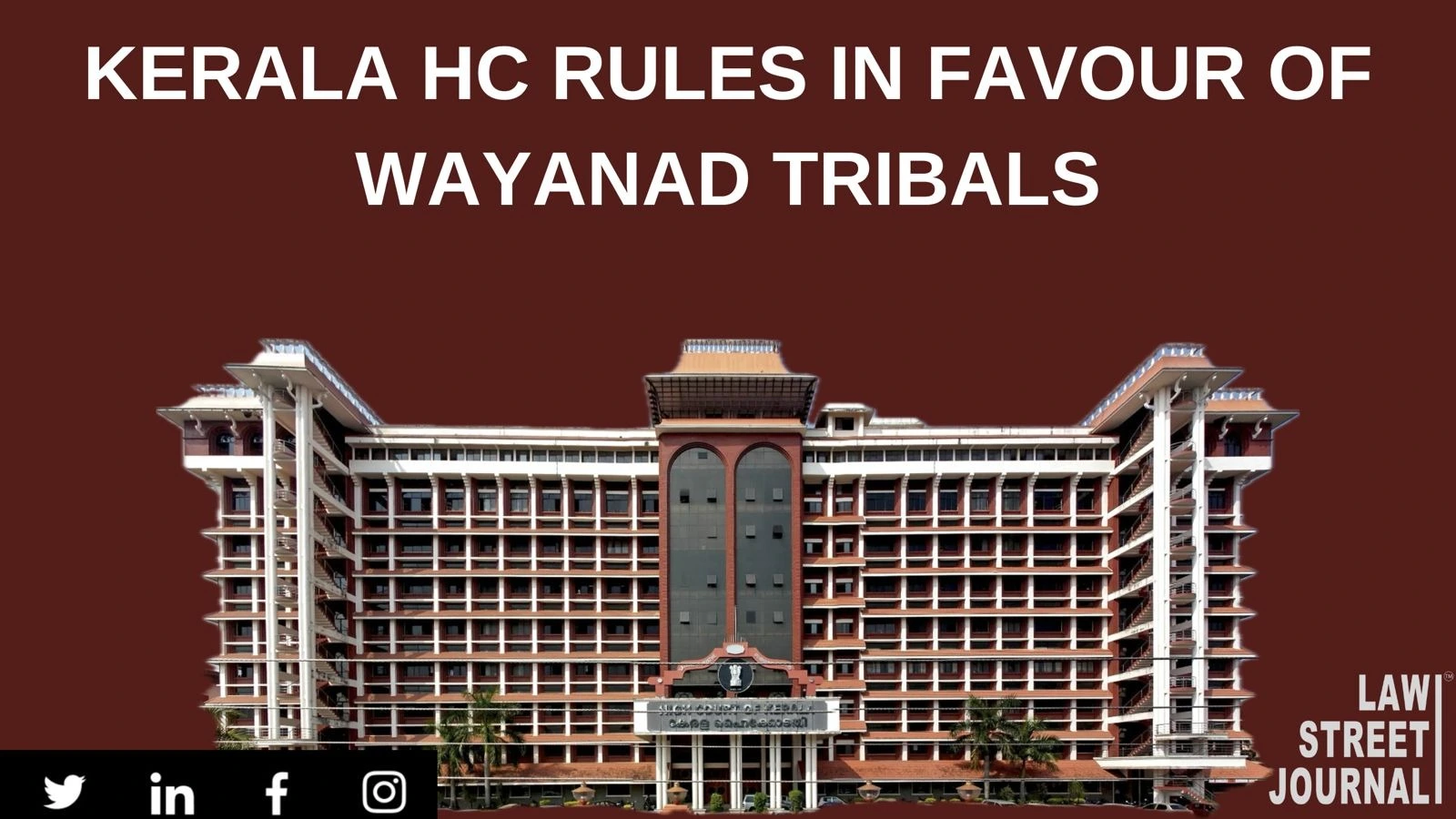Bangalore: In a strongly worded judgement, Justice PV Kunhikrishnan of the Kerala High Court came down heavily on the State government for its decision to assign 5.5358 hectares of land at 100 per acre to the Kallodi St. George Forane Church, who were actually encroaching the said land.
Upholding the fundamental rights of tribal persons in Wayanad, the judge said that when theres flagrant violation of law, the hands of the Court are not restricted. Apart from being illegal, this is like piercing a knife to the hearts of the innocent ever smiling tribals in Wayanad, the court said while quashing the 2015 government order and the consequential patta issued to the Church Authorities.
When there is injustice, arbitrariness, and flagrant violation of law, the hands of this Court under Article 226 of the Constitution are not restricted. Poor landless tribals are agitating to get lands for their livelihood and agriculture. Their agitation reached up to the Secretariat of the State. Thousands of applications of tribals are pending for getting land is the contention of the petitioners. In such a situation, as per Ext.P5 (2015 government order), huge Government land is assigned to the 5th respondent (St. George Church) invoking the powers of the Land Assignment Act and Rules. I am of the considered opinion that this is not only illegal but infringes the constitutional rights of the tribals including the petitioners. This is nothing but piercing a knife to the hearts of the innocent ever smiling tribals in Wayanad. This Court cannot shut its eyes to these illegalities.
The Court was hearing a plea moved by landless tribal community in Wayanad District. They were challenging a government decision wherein Government land was assigned at Rs.100/Acre to the St. George Church, overlooking the six thousand applications of the landless tribal people for a residential plot.
Notably, the judgement read in a rather poetic and beautiful manner, paying a tribute to the tribal persons in Wayanad. When we visit Wayanad, we can see them with innocent smiles on their faces in almost every nook and corner. About 20% of the population of Wayanad district are from tribal communities. The State Government is trying to give all sorts of help to the tribal community because of the peculiar nature of their life and also to uplift them along with the citizens of this country. But the majority of them want to follow their own traditional culture for which they want land and resources. But it is a fact that, even now several tribals are waiting to get a piece of land for agricultural purposes and to construct a dream house on their land in their own way.
It is the duty of the state and all of us to see that the tribals are happy and a beautiful smile continues on their face forever, the Court reminded before delving into the particular factual matrix and arguments.
After going through the rival contentions, the Court noted that the 5th respondent (St. Geroge Church) is an encroacher of 5.5358 hectares of land and further, the land occupied is worth about Rs 3.04 crores as of 2015. The property is assigned was for just Rs. 100/- per acre and so, rima facie, the assignment is unsustainable and is to be interfered with, the court stated while terming the whole process as thought-provoking.
The petitioners are tribals. Their history is mentioned in detail in the writ petition. Hundreds of tribals are waiting to get property and the Government is also trying to purchase private land to distribute to the tribals. In such circumstances, how the Government assigned 5.5358 hectares of land to the 5th respondent is thought provoking.
What public interest? HC questions Government
The Court also went through Rule 24 of the Kerala Land Assignment Rules which deals with powers of the government. As per this rule, the Government may if they consider it necessary to do in the public interest, assign land dispensing with any of the provisions contained in the Rules and subject to such conditions, if any, as they impose.
What is the "public interest" in this case to issue Ext. P5? It is submitted that there are 19 schools, High Schools, and Higher Secondary Schools on the premises. The church, cemetery etc., are also in this land. But it is an admitted fact that the 5th respondent is an encroacher to the Government land and constructed these buildings. After encroachment on land, if churches or schools or other buildings are constructed on the Government's land, can the Government assign the land based on "public interest"?, the Court noted, in the judgement.
The Court pointed out that encroachers of government land are not entitled to any equity and there is no public interest to assign a property when there is admitted encroachment. Once an encroachment has been identified, the State should take immediate measures to repossess the land.
The state machinery may be in difficulty to identify every encroachment in different parts of its territory. But once the encroachment is found out, the state machinery should work immediately to repossess the land, even if the encroachment is decades back, unless there is a legal impediment in taking possession of the same. No equity is available to such encroachers.
There is absolutely no public interest in this case to assign the land to the St. George Church as per Ext P5 (government order), the judge said. A bare reading of the above provision itself makes it clear that the same will not justify Ext.P5 and it will only worsen the case of respondents. Rule 7 says about the priority to be observed in the assignment. The 5th respondent will not come anywhere near the priority persons mentioned in Rule 7.
If the St. George Church is interested in purchasing the land especially where the church, cemetery, and schools are situated, the Government can think of selling the property to them after the competent authorities assess the market price, the Court suggested.
An option can be given to the 5th respondent to purchase the land based on the market value as of today. In such an event, the entire amount received by that transaction should be utilised for the welfare of tribals in Wayanad.
And, if this isnt acceptable to them, then they must be evicted from the property within six months, the court said while ordering the government to file an action before the Registrar General of this Court in eight months.








![Kerala HC Quashes 498A Dowry Harassment Case Against Live-In Partner, Citing Lack of Relative Status [Read Order]](/secure/uploads/2023/08/lj_5693_1057c042-1e57-4e27-8c9e-25af0ec38ec4.jpg)
![Watching porn on mobile: Kerala HC highlights importance of mother cooked meals, outdoor sports [Read Order]](/secure/uploads/2023/09/lj_9155_Parental_supervision_of_mobile_phone_usage.jpg)
![Lakshadweep MP Mohammed Faizal Disqualified from Lok Sabha After Conviction Suspension Plea Rejected by Kerala High Court [Read Notice]](/secure/uploads/2023/10/lj_9640_87b5fd97-0e05-4ff8-9a99-3be1e4446192.jpg)






